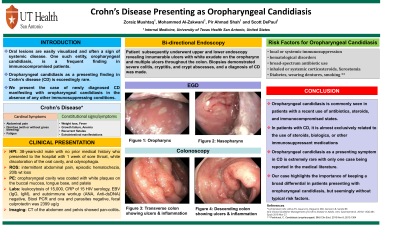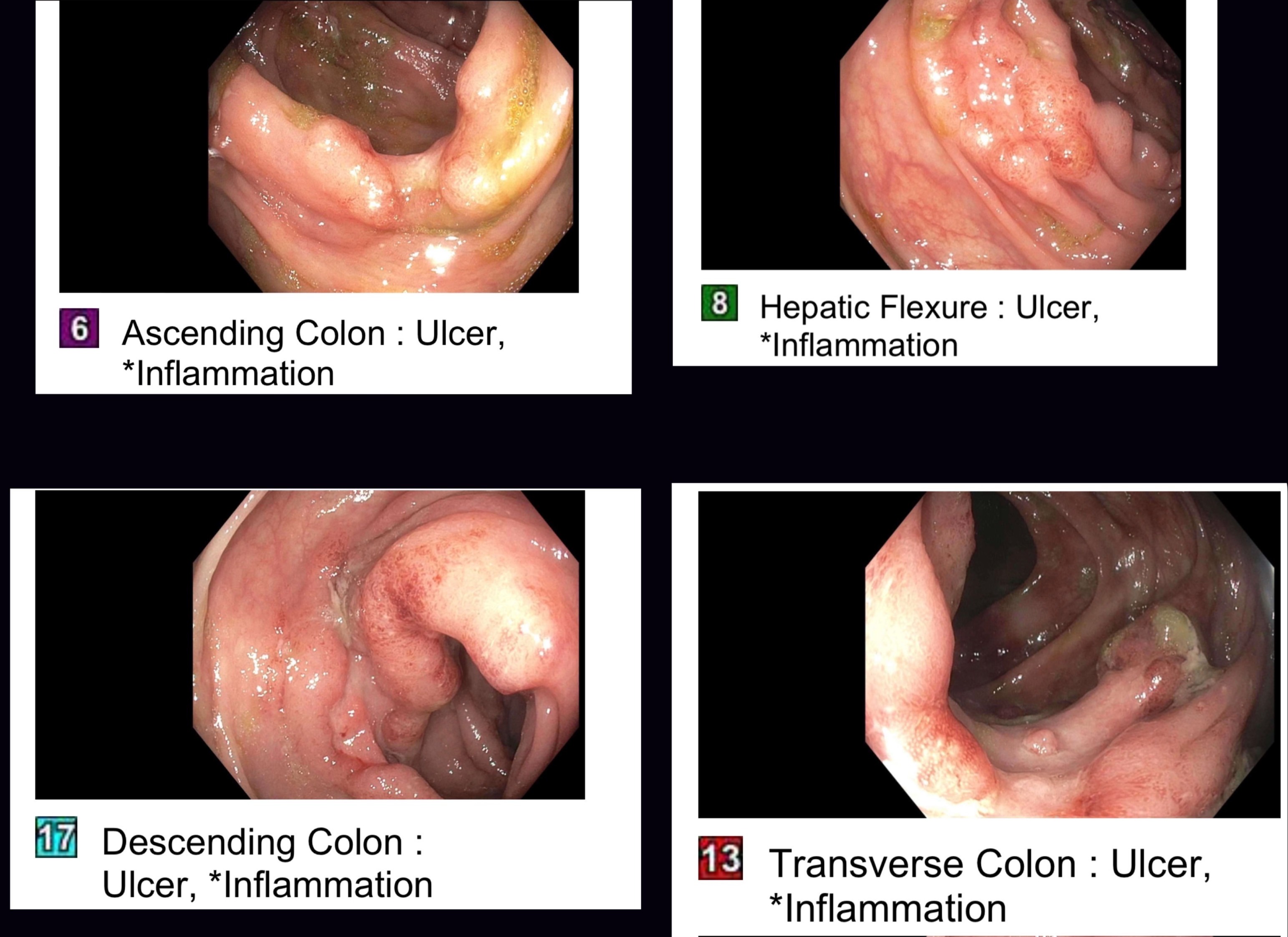Back


Poster Session D - Tuesday Morning
Category: IBD
D0422 - Crohn’s Disease Presenting as Oropharyngeal Candidiasis
Tuesday, October 25, 2022
10:00 AM – 12:00 PM ET
Location: Crown Ballroom

Has Audio

Zoraiz Mushtaq, MD
UTHSCSA
San Antonio, TX
Presenting Author(s)
Zoraiz Mushtaq, MD1, Mohammed Al-Zakwani, MD2, Pir Shah, MD1, Scott DePaul, MD1
1UTHSCSA, San Antonio, TX; 2University of Texas Health Science Center , San Antonio, TX
Introduction: Oral lesions are easily visualized and often a sign of systemic disease. One such entity, oropharyngeal candidiasis, is a frequent finding in immunocompromised patients. Oropharyngeal candidiasis as a presenting finding in Crohn’s disease (CD) is exceedingly rare. We present the case of newly diagnosed CD manifesting with oropharyngeal candidiasis in the absence of any other immunosuppressing conditions.
Case Description/Methods: A 38-years-old male with no prior medical history presented to the hospital with 1 week of sore throat, white discoloration of the oral cavity, and odynophagia. On review of systems, he also reported intermittent abdominal pain, episodic hematochezia, and a 20lb unintentional weight loss over the past several months. He took no medications and denied any high-risk sexual behavior.
On physical exam, his oropharyngeal cavity was coated with white plaques on the buccal mucosa, tongue base, and palate, consistent with a clinical diagnosis of oropharyngeal candidiasis. Initial blood work was remarkable for a leukocytosis of 15,000 and CRP of 15. His HIV serology, EBV (IgG, IgM), and autoimmune workup (ANA, Anti-dsDNA) were negative. Stool multiplex PCR assay and stool ova and parasites were negative as well. His fecal calprotectin was 2399 ug/g. Computed tomography scan of the abdomen and pelvis showed pan-colitis. He subsequently underwent upper and lower endoscopy revealing innumerable ulcers with white exudate on the oropharynx and multiple ulcers throughout the colon. Biopsies demonstrated severe colitis, cryptitis, and crypt abscesses, and a diagnosis of CD was made. The patient started high dose steroids in conjunction with anti-fungal medications and had rapid resolution of all symptoms.
Discussion: Oropharyngeal candidiasis is commonly seen in patients with a recent use of antibiotics, steroids, and immunocompromised states. In patients with CD, it is almost exclusively related to the use of steroids, biologics, or other immunosuppressant medications. Oropharyngeal candidiasis as a presenting symptom in CD is extremely rare with only one case being reported in the medical literature. Our case highlights the importance of keeping a broad differential in patients presenting with oropharyngeal candidiasis, but seemingly without typical risk factors.

Disclosures:
Zoraiz Mushtaq, MD1, Mohammed Al-Zakwani, MD2, Pir Shah, MD1, Scott DePaul, MD1. D0422 - Crohn’s Disease Presenting as Oropharyngeal Candidiasis, ACG 2022 Annual Scientific Meeting Abstracts. Charlotte, NC: American College of Gastroenterology.
1UTHSCSA, San Antonio, TX; 2University of Texas Health Science Center , San Antonio, TX
Introduction: Oral lesions are easily visualized and often a sign of systemic disease. One such entity, oropharyngeal candidiasis, is a frequent finding in immunocompromised patients. Oropharyngeal candidiasis as a presenting finding in Crohn’s disease (CD) is exceedingly rare. We present the case of newly diagnosed CD manifesting with oropharyngeal candidiasis in the absence of any other immunosuppressing conditions.
Case Description/Methods: A 38-years-old male with no prior medical history presented to the hospital with 1 week of sore throat, white discoloration of the oral cavity, and odynophagia. On review of systems, he also reported intermittent abdominal pain, episodic hematochezia, and a 20lb unintentional weight loss over the past several months. He took no medications and denied any high-risk sexual behavior.
On physical exam, his oropharyngeal cavity was coated with white plaques on the buccal mucosa, tongue base, and palate, consistent with a clinical diagnosis of oropharyngeal candidiasis. Initial blood work was remarkable for a leukocytosis of 15,000 and CRP of 15. His HIV serology, EBV (IgG, IgM), and autoimmune workup (ANA, Anti-dsDNA) were negative. Stool multiplex PCR assay and stool ova and parasites were negative as well. His fecal calprotectin was 2399 ug/g. Computed tomography scan of the abdomen and pelvis showed pan-colitis. He subsequently underwent upper and lower endoscopy revealing innumerable ulcers with white exudate on the oropharynx and multiple ulcers throughout the colon. Biopsies demonstrated severe colitis, cryptitis, and crypt abscesses, and a diagnosis of CD was made. The patient started high dose steroids in conjunction with anti-fungal medications and had rapid resolution of all symptoms.
Discussion: Oropharyngeal candidiasis is commonly seen in patients with a recent use of antibiotics, steroids, and immunocompromised states. In patients with CD, it is almost exclusively related to the use of steroids, biologics, or other immunosuppressant medications. Oropharyngeal candidiasis as a presenting symptom in CD is extremely rare with only one case being reported in the medical literature. Our case highlights the importance of keeping a broad differential in patients presenting with oropharyngeal candidiasis, but seemingly without typical risk factors.

Figure: Ulcers seen during the colonoscopy procedure
Disclosures:
Zoraiz Mushtaq indicated no relevant financial relationships.
Mohammed Al-Zakwani indicated no relevant financial relationships.
Pir Shah indicated no relevant financial relationships.
Scott DePaul indicated no relevant financial relationships.
Zoraiz Mushtaq, MD1, Mohammed Al-Zakwani, MD2, Pir Shah, MD1, Scott DePaul, MD1. D0422 - Crohn’s Disease Presenting as Oropharyngeal Candidiasis, ACG 2022 Annual Scientific Meeting Abstracts. Charlotte, NC: American College of Gastroenterology.
